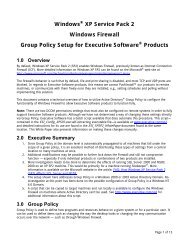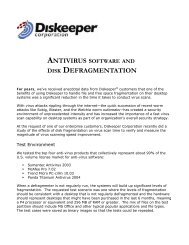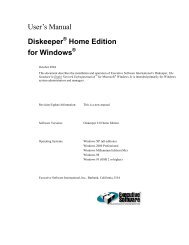Diskeeper 10 User's Manual
Diskeeper 10 User's Manual
Diskeeper 10 User's Manual
Create successful ePaper yourself
Turn your PDF publications into a flip-book with our unique Google optimized e-Paper software.
Can <strong>Diskeeper</strong> defragment the Master File Table?<br />
Answers to Frequently Asked Questions 65<br />
The Master File Table (MFT) is the area on an NTFS disk volume where Windows NT, Windows 2000,<br />
Windows XP, and Windows Server 2003 keep the necessary information for retrieving files from the disk<br />
volume. The MFT also contains information such as file creation, modification, and backup dates and times.<br />
Because the MFT is held open for exclusive use by Windows, <strong>Diskeeper</strong> does not move any pieces of this<br />
critical system file while Windows is running, but can do so safely at boot-time. For more information, see page<br />
38.<br />
Why doesn’t <strong>Diskeeper</strong> completely consolidate the free space on my volume?<br />
Several factors can prevent the free space on a volume from being defragmented:<br />
• A fragmented paging file. For more information, see page 38.<br />
• A large number of directories on the volume. For more information, see “Can <strong>Diskeeper</strong> move<br />
directories?” on page 64.<br />
On NTFS volumes, a portion of the free space on the volume is reserved by Windows for the Master File Table<br />
(MFT). For more information, see Why don’t my files get moved to the beginning of the volume? on page 65.<br />
Note that you can specify the “Comprehensive” defragmentation method, which emphasizes free space<br />
consolidation. See page 43 for more information about the different defragmentation methods available.<br />
It is important to know that having all of the free space in a single, contiguous piece provides very little (if any)<br />
performance benefit. Free space fragmented into hundreds of pieces will impact disk performance, but free<br />
space that’s in a few pieces should not have any effect on the performance of your disk.<br />
Why don’t my files get moved to the beginning of the volume?<br />
On NTFS volumes, Windows NT, Windows 2000, Windows XP, and Windows Server 2003 reserve a portion<br />
of the free space on a disk volume for the Master File Table (MFT). This free space is usually most noticeable<br />
at the physical “beginning” of the volume (easily seen using Volume Map tab), but space is also reserved for<br />
use by the MFT in other areas of the volume.<br />
Since this space is reserved for exclusive use, <strong>Diskeeper</strong> will not move files into these areas of the volume, but<br />
will move them out of these areas.<br />
Why don't all of my NTFS volumes appear in the <strong>Diskeeper</strong> Volume List?<br />
Both SYSTEM and ADMINISTRATOR must have full control over a file (or the directory folder it is in) in<br />
order for <strong>Diskeeper</strong> to have access to move the file. This is because the <strong>Diskeeper</strong> service runs under the<br />
Administrator account, and System access is necessary to defragment files safely. This is a security feature<br />
governed by the Windows NT, Windows 2000, Windows XP, and Windows Server 2003 C2 security<br />
requirements.<br />
If the root-level directory folder does not have SYSTEM and ADMINISTRATOR set for full control (as seen<br />
in the Permissions section under the Security tab in the Properties dialog box) <strong>Diskeeper</strong> will not display the<br />
disk volume in the Volume list under some circumstances.<br />
How do I determine how often to run <strong>Diskeeper</strong> on my volume?<br />
This depends on many factors, including the level of file activity, the sizes and types of files used, and the<br />
amount of free space available on the volume. While there are no set rules on how often to defragment your<br />
disk volumes, here are some guidelines.<br />
• Of course, the first suggestion is to let the <strong>Diskeeper</strong> Smart Scheduling feature automatically and<br />
dynamically determine the optimum run frequency for your particular disk volumes. Smart Scheduling<br />
monitors the fragmentation levels of your volumes and adjusts the defragmentation schedule to best fit<br />
your needs, even as those needs change. See Smart Scheduling on page 33.<br />
• Disk volumes on busy file servers should be defragmented more often than those on single-user<br />
workstations. You may need to run <strong>Diskeeper</strong> on a server volume as often as every two to four hours to






